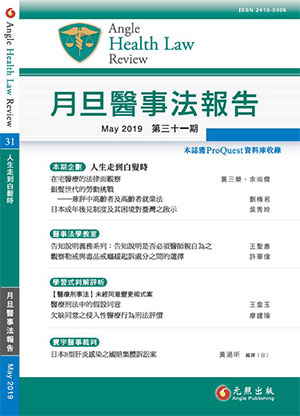日本成年後見制度及其困境對臺灣之啟示【本期企劃】 試閱
The Dilemma and Its Inspiration of Japanese Adult Guardian System
日本與臺灣皆急速步入高齡化社會,就65歲以上的高齡人口比率而言,日本早於2005年逾20%,成為「超高齡社會」;臺灣則於2018年9月達14.3%,正式邁入「高齡社會」。為滿足民眾長期照顧之需求,保障失智症、知能及精神障礙者等權益,日本乃制定介護保險法並修正民法成年後見(成年監護)等制度,並均自2000年4月1日起實施。在高齡社會,高齡者於交易、締約、財產處理或照護服務之使用上,由於判斷能力的欠缺或不足,常有被詐欺、脅迫締結契約,或遭受虐待、財產被侵占等情形,故現行法律對高齡者之保護是否足夠,值得檢討。尤其臺灣民法成年監護制度,僅設有「法定監護」並無「意定監護」,且宣告監護時,剝奪受監護者之行為能力,乃明顯牴觸身心障礙者權利公約,從而確有修法之必要。
Both Japan and Republic of China are being aged society rapidly. The rate of senior citizens (over 65 years old) has exceeded 20% in Japan in 2005, which made it an “aged society”. The country became an aging society as well when its rate of elders reached 14.3% in 2018. To help people with their long term care needs, dementia and other mental disorder protection, Japan has established adult guardian system in the Law of Nursing Care Insurance and amended its Civil Law accordingly. Both Laws were enacted in April 1st, 2000. In aged societies, because of their lacking or deficient in making judgement, elders are prone to being cheated, forced to bind a contract or mistreated, deprived of properties. Whether the protection of law is enough is worthy of reviewing. In Taiwan, the adult guardian system stipulated in Civil Law has only “legal guardianship” but “intended guardianship,” and the behavioral ability of the ward is to be deprived when his/ her guardian is announced. This obviously violates The Convention on the Rights of Persons with Disabilities, the Civil Law needs to be amended.
050-065






